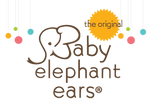4 Ways to Encourage Your Baby's Social Development
30th Oct 2015
 There's nothing that compares to a baby's first laugh. We're
instantly reminded of the person they will become and the love they will bring
into the world. Most parents would like their child to grow up to be
well-liked, respected and confident in social settings. Some parents feel it is
their duty to shape their children's personality as early as possible. It's
important to remember that social grace and personality are things that are
embedded over time, but there are a few things we can do to encourage your
baby's social development.
There's nothing that compares to a baby's first laugh. We're
instantly reminded of the person they will become and the love they will bring
into the world. Most parents would like their child to grow up to be
well-liked, respected and confident in social settings. Some parents feel it is
their duty to shape their children's personality as early as possible. It's
important to remember that social grace and personality are things that are
embedded over time, but there are a few things we can do to encourage your
baby's social development.
1. Talk to baby in the womb
Before your baby is even born he or she will have the tendency to listen to your voice. You may already do this naturally, but make a habit of speaking to your baby in the womb and exposing him or her to music and social sounds.
2. Babble around your newborn
Trying to maintain dialogue with your family around your newborn will in fact have an effect on how your baby interacts as they grow. Exposing your baby to different tonalities and expressive body language encourages social development. Making large facial expressions and nearly exaggerated voices to express your emotions expedites baby’s understanding of social cues.
3. Converse with your baby
Although it seems like your baby doesn’t quite understand you yet, make a habit of talking to your baby as if he or she will talk back. Asking your baby questions like “Are you hungry?” “Do you like this color?” may seem silly at first but it does prompt your infant to feel inclined to respond. It also encourages communicative confidence when you give your infant a turn to speak. You will be surprised how responsive your baby is to questions and conversations from a very young age through body language. Babies begin to recognize facial expressions and basic human emotion much earlier than most people think. By 2 months old a baby will likely be able to tell the difference between happiness, surprise, anger, and even fear. Being a little goofy with the lengths you go to express these basic emotions encourages baby’s social understanding of them.
4. Tickle and Cuddle
The power of human touch is undeniable. Most moms and dads already feel inclined to frequently touch, tickle and cuddle with their baby, but in doing this you are developing his or her social skills. Babies are very responsive to the way they are touched and they are actively learning how to react. So hug, kiss and cuddle as much as you can.
Show us a picture or you and your baby cuddling on our Facebook page! We’d love to see.
Written by Alicia Overby - Founder & President of Baby Elephant Ears
Alicia is wife, mother, and creator of Baby Elephant Ears. Baby Elephant Ears was created out of parental concern, not financial desire. In 2005, when their second child was an infant, he cried all the time and just couldn't seem to get comfortable.
After seeking advice and suggestion from the medical community and alternative medicine, they eventually ended up in the chiropractors office where their baby was successfully treated for asubluxation, discomfort most likely the result of the strain during labor, which was now being exacerbated by the normal lack of infant neck strength. Only proper neck, head, and back alignment would offer him relief. When they couldn't find a product to give their baby the necessary support, Alicia took matters into her own hands and crafted her own infant support pillow. The first Baby Elephant Ears was born!
For more information, visit www.babyelephantears.com.
Interested in writing a guest blog for Baby Elephant Ears? Send your topic idea to pr@babyelephantears.com.
All data and information provided on this site is for informational purposes only. Baby Elephant Ears makes no representations as to accuracy, completeness, current-ness, suitability, or validity of any information on this site and will not be liable for any errors, omissions, or delays in this information, or any losses, injuries, or damages arising from its display or use. All information is provided on an as-is basis.


